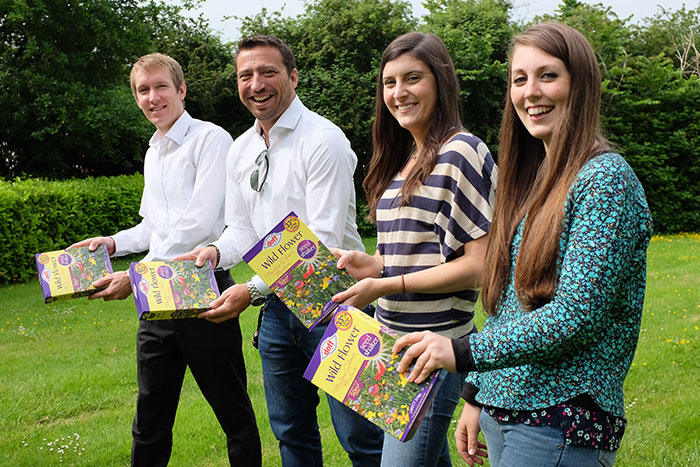Yesterday we kicked off Business Green Week with a thought-provoking video and discussion that got the team thinking about the impacts of our everyday decisions on the world around us.
The discussion focused on the things we could improve upon to reduce our environmental impact, so today we decided to encourage some action among the team.
Today’s green week theme is ‘Think Local’ and we’ve got our staff thinking about a change they could make right outside their back door! We’ve bought wildflower seeds and have encouraged our team to each take home a bag. The idea is that they will dedicate a patch of their lawn or garden to grow wild by scattering the seeds there and letting them grow into a wildlife haven.
We’ve noticed these wild meadow patches popping up more and more around Bristol as areas of our city parks are being left to grow. Allowing the grass to get a little taller and wildflowers to start popping up has many benefits. The height of the grass and flowers provides shelter and food for critters down below. Up above the flowers provide vital food for bees in the form of nectar and pollen. With the rapid decline of bee populations this is a simple and beautiful way to encourage them to pollinate around your neighbourhood. What's not to like?!

Have you grown a wild meadow in your garden or around your home? Comment below and tell us your experience, we’d love to get some more inspiration!
Come back tomorrow to read how we work to lower our impact in the office by cracking down on our energy consumption for the 'Low impact' day of Business Green Week.

Abigail Warren
Head of Client Services
Abigail joined Ecosurety in 2015 and is now Client services manager, ensuring our team provide valuable support to our clients and look for additional value we can add beyond compliance. She graduated in 2014 with a BSc in Environmental Studies from Suffolk University in Boston, Massachusetts. Her degree is a reflection of her passion for environmental issues, which were evoked while growing up surrounded by the beautiful natural landscape of New England.

Useful links
In 2023, 162,357 tonnes of aluminium packaging were recycled in the UK (68%), including more than four in five beverage cans (81%).
Read More >>On 24 April, the EU’s Packaging and Packaging Waste Regulation (PPWR) was approved, introducing new measures to make packaging more sustainable and reduce packaging waste within the EU.
Read More >>A provisional agreement has been reached on the EU’s Packaging and Packaging Waste Regulation (PPWR).
Read More >>Latest News

Q2 2024 recycling data shows strong performance in H1
By Sam Marshall 24 Jul 2024
Ecosurety continue to step up for refill and reuse
By Victoria Baker 24 Jun 2024
Ecosurety renews B Corp™ certification with flying colours
By Louise Shellard 11 Jun 2024
